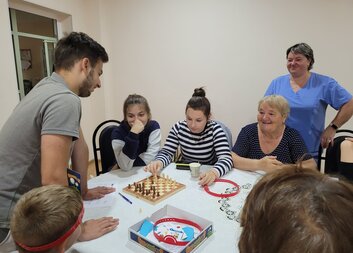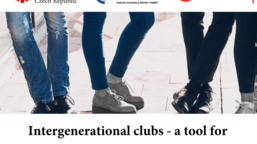In Moldova, loneliness among the elderly people is a pressing issue, exacerbated by a lack of social engagement opportunities. Recognizing this, Caritas Czech Republic, in collaboration with AO Homecare, has launched a meaningful initiative to bridge generational gaps and address the emotional and social needs of elderly people. Through the establishment of Intergenerational Clubs at five selected social and health centres, Caritas Czech Republic is fostering connection, understanding, and mutual learning between younger and older generations.
Here are the five reasons why intergenerational clubs are important not only for elderly people.
1. Combating loneliness and isolation
Loneliness is a silent epidemic among Moldova’s elderly population, many of whom live alone or lack regular interaction with others. Intergenerational Clubs provide a safe, welcoming space for elderly people to connect with others. These sessions, held twice a month, bring together at least 20 participants, offering a consistent opportunity for interaction and companionship. By engaging in meaningful activities, elderly participants not only find solace in human connection but also develop a sense of belonging that significantly improves their mental and emotional well-being.
2. Promoting mutual learning and respect
Intergenerational Clubs are a platform for shared learning and mutual respect. Young people gain invaluable wisdom and life lessons from older participants, while the elderly people are inspired by the energy and fresh perspectives of the youth. For example, digital literacy sessions allow teenagers to teach elderly people how to navigate technology, while older people can share traditional skills like knitting or storytelling. These exchanges foster mutual appreciation and understanding, breaking down stereotypes and bridging generational divides.
3. Encouraging social inclusion and empathy
In a society where generational differences can often lead to misunderstandings and isolation, Intergenerational Clubs play a crucial role in promoting social inclusion. By creating a shared space for dialogue and collaboration, these clubs reduce age-related stigmas and encourage empathy. Participants learn to appreciate the unique challenges and strengths of each life stage, cultivating a culture of mutual support and inclusion.
4. Enhancing mental health and well-being
The structured activities within Intergenerational Clubs have a profound impact on mental health. Engaging in creative and social activities like crafts, storytelling, and board games boosts self-esteem and cognitive function among elderly participants. The clubs also serve as informal support networks, where participants can share their feelings and experiences. These positive interactions reduce stress, improve emotional resilience, and promote overall mental well-being for both parties.
5. Strengthening community bonds and civic engagement
Intergenerational Clubs contribute to stronger, more cohesive communities. By bringing different age groups together, these clubs foster a sense of unity and shared purpose. Participants often collaborate on community projects, volunteer initiatives, and cultural events, further strengthening social bonds. The involvement of youth also promotes the concept of active aging, inspiring younger generations to value and support the elderly people in their communities.
A sustainable initiative for social change
The Intergenerational Clubs are part of a broader effort by Caritas Czech Republic to enhance social services in Moldova. Alongside Occupational Therapy services, the clubs are piloted in 5 health and social centres, with trained staff moderating sessions to ensure meaningful engagement. Specialists with psychological expertise guide these sessions, creating an environment conducive to open communication and mutual understanding.
Although still in its early stages, the initiative is already making a difference. Over 80 young people have actively joined the clubs, engaging with older people and contributing to the vibrancy of their communities. The feedback from participants highlights the transformative power of these interactions, they express renewed joy and purpose, while younger participants report a deeper appreciation for the experiences and wisdom of their older counterparts.
Caritas Czech Republic’s initiatives in Moldova
Caritas Czech Republic has opened 11 home care centres in Moldova. In addition to social support, these centres also provide health services. For many elderly people, a check-up with a doctor is physically and financially demanding. Thanks to financial support from the Czech Development Agency, we have introduced telemedicine services in 8 health centres across Moldova. As part of this development, 24 medical and social workers now provide consultations and care services for the elderly and those in need of long-term care.
Along with this programme, Caritas Czech Republic has taken a step towards improving the sustainability and efficiency of water resource use by introducing an innovative initiative to use rainwater as an alternative water source in Moldova. During 2024, a system for capturing, filtering and storing rainwater for domestic use will be built in the kindergarten Albinuța in the village of Bilicenii Vechi, Sîngerei district, with the involvement of Czech and national experts.












